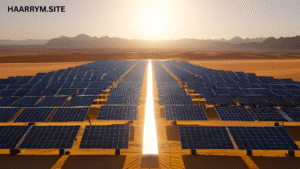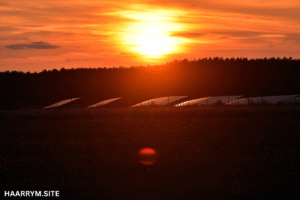Among the most amazing natural events you will ever see is a solar eclipse. Regarding eye safety, nevertheless, many people question: Can I observe the solar eclipse using polarized sunglasses?
The quick and clear response is no; polarized sunglasses are not safe for straight observation of a solar eclipse. Though many people think, they do not provide the required shielding from the strong solar radiation during this astronomical event.
We’ll go over in this post why polarized sunglasses fail, the risks of incorrect eclipse viewing, what you should use instead, and safe preparation techniques. This guide is your one-stop reference for eclipse watching safety regardless of your level of interest in the heavens or your concerns as a parent.
Understanding the Solar Eclipse
Before diving into safety measures, it’s important to understand what a solar eclipse is.
A solar eclipse occurs when the Moon passes between the Earth and the Sun, casting a shadow and partially or totally blocking the Sun’s light in certain areas. Depending on the alignment, you may experience:
-
Partial Solar Eclipse – The Sun is only partially obscured.
-
Total Solar Eclipse – The Moon completely covers the Sun.
-
Annular Eclipse – The Moon is too far to completely cover the Sun, leaving a “ring of fire” visible.
-
Hybrid Eclipse – A rare type that shifts between total and annular depending on your location.
While the sight is spectacular, looking directly at the Sun — even during a partial eclipse — can cause severe eye damage or even permanent blindness.
What Are Polarized Sunglasses?
Polarized sunglasses are designed to reduce glare caused by reflections from surfaces like water, glass, or roads. They contain a special chemical film that filters horizontal light waves, improving contrast and clarity.
These sunglasses are excellent for activities such as:
-
Driving
-
Fishing
-
Boating
-
Hiking
-
Skiing
But here’s the catch: they are not designed to block the Sun’s intense rays, especially not the kind emitted during a solar eclipse.
Why You Should NOT Use Polarized Sunglasses for Solar Eclipse
1. Inadequate Light Filtering
The Sun radiates strong UV and IR wavelengths. Polarized lenses lower glare, but they do not block enough of this damaging radiation to make them safe for eclipse viewing.
Thousands of times more sunlight passes through even the darkest polarized sunglasses than what is advised safe for your eyes during a solar eclipse.
2. False Sense of Safety
Because polarized lenses make the Sun appear dimmer, they can trick you into thinking it’s safe to look directly at it. This false confidence can lead to extended exposure and irreversible eye damage.
3. No Standardized Eclipse Safety Certification
Proper solar viewing glasses must comply with the ISO 12312-2 international safety standard. Polarized sunglasses are not certified for solar viewing and lack the filtering materials to meet this strict safety requirement.
4. Risk of Retinal Burns (Solar Retinopathy)
Looking at the Sun without proper protection — even for a few seconds — can lead to solar retinopathy, a condition where intense solar rays burn the retina. This condition is painless, meaning you may not realize the damage until it’s too late.
Symptoms may include:
-
Blurry vision
-
Blind spots
-
Distorted or washed-out vision
-
Difficulty focusing
What Can You Use Instead?
✅ Eclipse Glasses
The safest and most accessible option for watching a solar eclipse is ISO-certified eclipse glasses. These specialized filters are:
-
At least 100,000 times darker than regular sunglasses
-
Designed to block 100% of UV and IR radiation
-
Manufactured under strict guidelines to protect your eyes
Make sure your eclipse glasses have the label:
“ISO 12312-2:2015 Certified”
✅ Welder’s Glass (#14 or higher)
A less frequent but useful substitute is a 14 or higher shade number welding glass. These are used in industrial environments to guard against arc welding and other strong light sources.
Lower shadow values, like 12 or less, are not safe for sun viewing.
✅ Pinhole Projectors
If you can’t find eclipse glasses, a pinhole projector is a DIY method for indirectly viewing the eclipse. You don’t look at the Sun; instead, you watch its shadow projected onto a surface.
This is a safe and creative method, especially for kids or classrooms.
Common Myths Debunked
❌ “I can stack multiple sunglasses.”
Even stacking multiple polarized sunglasses won’t give you adequate protection. They don’t block infrared radiation, and layering doesn’t improve their filtering ability to the required level.
❌ “The Sun is less intense during an eclipse.”
No — the Sun’s intensity doesn’t change. Only your perception of brightness does. You still risk burning your retinas just as fast during a partial eclipse as on a regular sunny day.
❌ “Clouds make it safer to look.”
Clouds may dim the light, but they don’t block UV or IR radiation. Looking through clouds can still result in serious eye damage.
What Happens If You Ignore the Warnings?
People who ignore eclipse viewing safety protocols have ended up with:
-
Partial or total blindness
-
Permanent blind spots
-
Retinal scarring
-
Color perception changes
Because the retina lacks pain receptors, the damage often goes unnoticed until hours or days later — when it’s too late to reverse.
How to Check If Your Eclipse Glasses Are Safe
The market is flooded with counterfeit eclipse glasses, especially close to eclipse dates. Here’s how to check:
🔍 Look for ISO Certification:
Ensure it says:
“ISO 12312-2 compliant” — preferably also marked with the manufacturer’s name and address.
🛑 Test Them Indoors:
Put them on inside your home. You should not be able to see anything except very bright lights (like a bright LED or the sun). If you can see anything else, they’re not safe.
📆 Check Expiry Date:
Some eclipse glasses come with expiration dates. If they’re scratched, damaged, or more than 3 years old, do not use them.
What to Do During the Eclipse
✔ Only Remove Glasses During Totality (Total Eclipses Only)
If you’re lucky enough to witness a total solar eclipse, you can safely look at the Sun only during the total phase — when the Moon fully covers the Sun.
As soon as the Sun begins to reappear, immediately put your glasses back on.
✔ Supervise Children Closely
Kids are naturally curious and might remove their glasses. Supervise them at all times and explain the importance of not looking directly at the Sun.
✔ Use Cameras and Telescopes Safely
If using a telescope, binoculars, or camera, make sure to attach a proper solar filter to the front of the lens. Do not use eclipse glasses in place of a solar filter on equipment — they can melt and cause eye injury.

Final Thoughts: Can I Use Polarized Sunglasses for Solar Eclipse?
All things considered, the answer to “Can I use polarized sunglasses for solar eclipse,” is a strong no.
In daily life, polarized sunglasses may help to lower glare and enhance vision; yet, they provide hardly the protection required to see the Sun—even during an eclipse. The risk comes from strong infrared radiation as well as UV light; polarized glasses do not stop either.
For an interesting and safe experience, instead create a pinhole projector or get ISO-certified eclipse glasses. Rare and amazing are solar eclipses; don’t allow inadequate eye protection convert a wonderful event into a lifetime of regret.
FAQ: Solar Eclipse and Eye Safety
Q: Can I use my phone to look at a solar eclipse?
No — unless your phone has a solar filter and you’re not looking directly at the screen outdoors. Reflections and brightness can still be harmful.
Q: Can I use 3D movie glasses or ski goggles?
Absolutely not. These are not designed to filter sunlight and offer zero protection from UV or IR rays.
Q: Are polarized sunglasses better than regular sunglasses for an eclipse?
They might reduce more glare than regular sunglasses but neither are safe for eclipse viewing.
Q: What if I already looked at the eclipse without protection?
If you experience blurry vision, pain, or blind spots, seek an eye doctor immediately.
If you’re preparing for the next eclipse, start gathering proper gear early and share this guide to help others stay informed. Remember, it’s not just about seeing the eclipse — it’s about seeing it safely.
